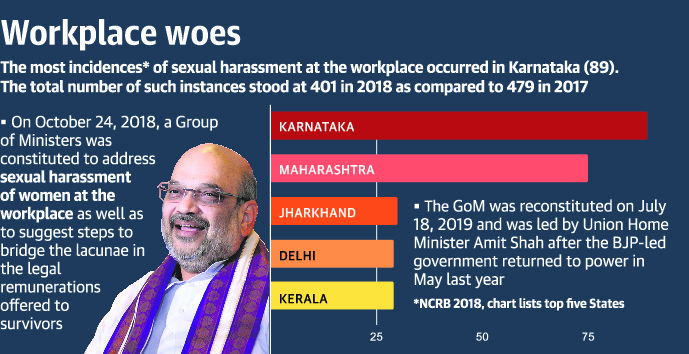On January 19, 2020 the Group of Ministers(GoM) headed by Union Minister of Home Affairs(MoHA) Shri Amit Shah constituted to further strengthen legal frameworks to prevent sexual harassment at the workplace, has now finalised the recommendations for it. The recommendations in brief are as follows: Recommendations finalised by the GoM:
Recommendations finalised by the GoM:
i.Addition of new provision in the Indian Penal Code(IPC) was recommended by the panel and will be put up for public comments.
ii.The existing laws on sexual harassment at the workplace would be incorporated when the overhaul of the IPC was complete. MoHA is also working to reboot the IPC which was introduced by the British in 1860.
iii.Sections to be amended: Various sections in the IPC as well as Code of Criminal Procedure (Cr. PC) are to be amended and several retired judges, legal luminaries and State governments are being consulted by the Bureau of Police Research and Development (BPR&D) for this purpose.
- After amendment, the sections on crime against women will also be amended.
iv.The amendments proposed will be largely based on the Vishaka guidelines which was laid down by the Supreme Court(SC) in 1997 based on which the above mentioned 2013 sexual harassment act was formed.
GoM constitution:
i.The GoM was first constituted in October 2018 after the #MeToo movement in which women from all around India as well as other countries shared their ordeal using the hashtag ‘#MeToo’ in social media.
ii.Reconstitution: The GoM was reconstituted in July 2019.
iii.Members in the panel: The panel members include Union Minister of Finance(MoF) Smt.Nirmala Sitharaman; Union Minister of Human Resource and Development(MHRD) Shri Ramesh Pokhriyal and Union Minister for Women and Child Development (MoWCD) Smt. Smriti Zubin Irani.
Sexual Harassment of Women and Workplace (Prevention, Prohibition and Redressal) Act in 2013:
i.The Ministry of Women and Child Development (WCD) paved the way for the Sexual Harassment of Women and Workplace (Prevention, Prohibition and Redressal) Act in 2013, which made employer to deter sexual harassment happenings in government offices, the private sector, NGOs and the unorganised sector.
ii.Shortcomings of the 2013 act:
Sexual Harassment of Women and Workplace (Prevention, Prohibition and Redressal) Act in 2013 had several shortcomings which include
- Exerting powers of a civil court to internal complaints committee (ICC) without specifying if the members need to have a legal background.
- Only Rs.50,000 was imposed on employers on cases for non-compliance.
- Only after the conclusion of the enquiry, a woman will be provided assistance by employer incase the woman chooses to file a complaint under the IPC.
J.S Verma Committee:
i.The GoM also reviewed Jagdish Sharan Verma committee which was constituted after the Nirbhaya gang-rape and murder in 2012.
ii.The Verma committee recommended for an employment tribunal instead of ICC.
NCRB data:
i.Registered sexual harassment cases: As per the National Crime Records Bureau (NCRB), 479 and 401 sexual harassment incidents in 2017 and 2018 respectively were registered under IPC Section 509 (words, gesture or act to insult the modesty of a woman).
- In 2018 Highest no of cases were registered in Delhi (28), Bengaluru (20), Pune (12) and Mumbai (12).
- The MoHA previously in December 2018 wrote to all States to ensure that the ICC under the 2013 Act was constituted and notified to the police departments.
About Ministry of Home Affairs(MoHA):
Headquarters- New Delhi.
Founded- 15 August 1947.
Minister of State(MoS)- Gangapuram Kishan Reddy (Constituency- Secunderabad, Telangana).





